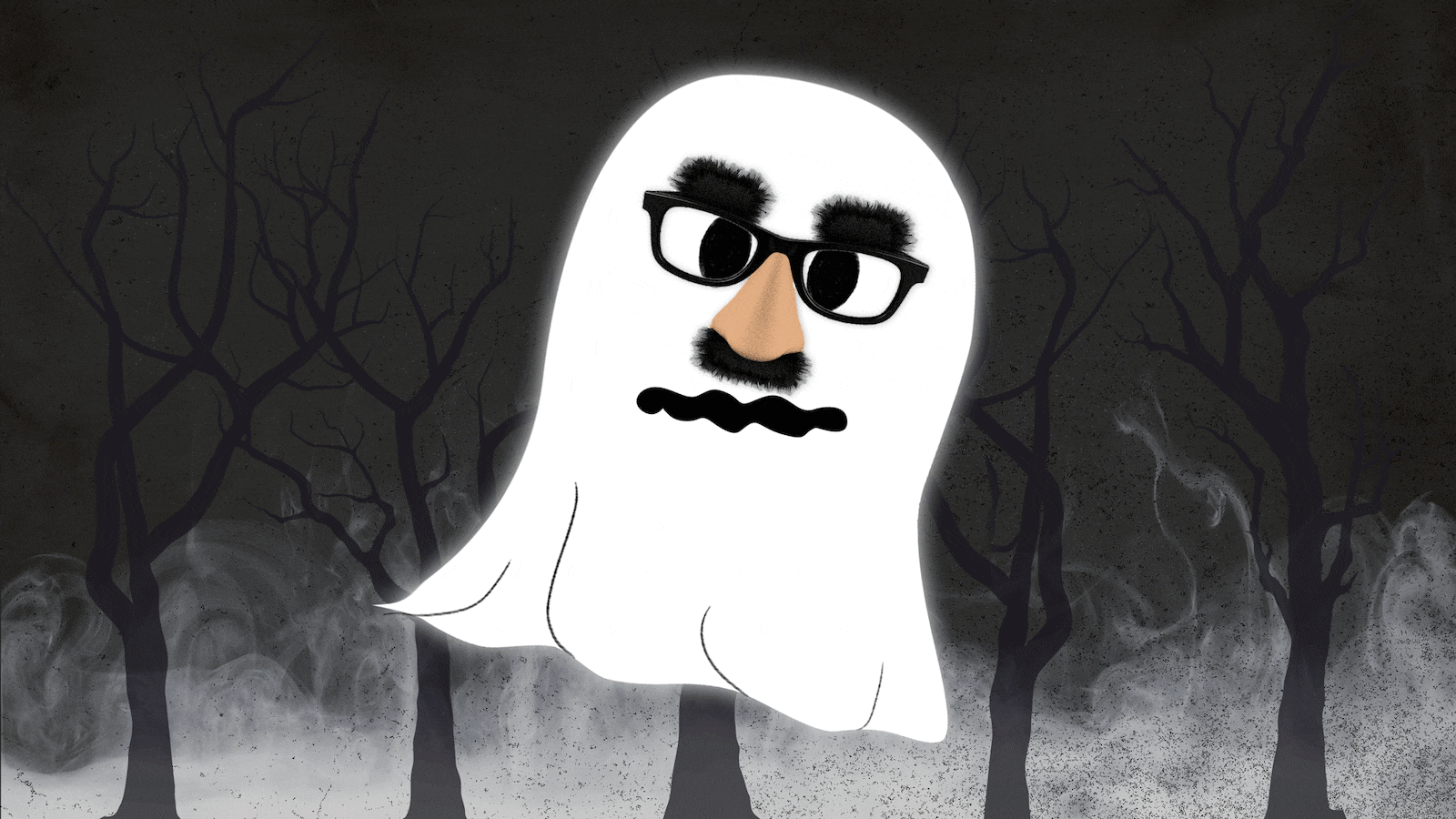As anyone with a cursory knowledge of Halloween knows—which is to say, anyone from age two and up—the model ghost is a haunt who is skilled at parting you from your ability to remain unafraid.
Whether emerging from beneath your bed, the recesses of your closet, or the family crypt where you drink a pony of liquor each year to toast those who’ve have gone before, the best ghosts are in the terror business.
But what of the ghosts who make us laugh? What of their rich literary history? In even the scariest ghost stories, there tends to be some humor. Something potent often sparks its opposite, so humor works well with terror for the same reason that you see death and life and love and hate riding together.
So, let us wander the Great Hall of Funny Spooks, starting with one engineered by Nathaniel Hawthorne called “The Ghost of Dr. Harris.” The work was composed in a single day, in the late summer of 1856, with Hawthorne preferring to comment that this was a true story—or a witnessed one, anyway, witnesses being fallible—that was told to him, concerning a guy who really ought not to be at the Boston Athenaeum. This is a series of reading rooms here in the Hub, about a mile from where I sit writing this, which I walk past often, in some hope—no joke—of seeing the titular doctor outside, facing the gold-domed State House, which is just up the hill.
This story isn’t a side-splitter, but there is chicanery at play. Ghosts, until this point, had been fairly serious entities. Shakespeare used a lot of them, and Dickens too, much more than A Christmas Carol, and while works like that one could be very funny, the ghosts weren’t. Remember, Marley’s marching orders were to scare unrepentant Scrooge witless, using whatever means necessary, which is why he unwraps the cloth around his head and his jaw falls to the floor.
Hawthorne wanted a different effect, though. His story is about a young man who reads at the Athenaeum, where there is also the Reverend Doctor Harris, a venerated member, whom no one really bothers, not that there’s a lot of free-flowing conversation at this place. He sits fireside, always in the same chair, reading the Boston Post, which no longer exists, but which this guy loves. He reads it like you read The Daily Beast—addicted! Through thick and thin. One time the narrator sees him, then learns after the fact that Dr. Harris died earlier. So what the hell did he see?
Well, he saw the doctor’s ghost still following the previously living doctor’s routine. The humor comes in with the narrator not saying anything, save to remark, each time this happens, that it’s weird now that he wasn’t more weirded out then. Do you think? Old guys are passing out in chairs near the doctor, and the narrator can’t tell if they see what he sees, or if they’re just old guys who fade out from the scene and into their naps. There’s no menace, no threat, just this oddity that is kind of amusing. Your ribs aren’t so much tickled as warmly rubbed, but the stir of a laugh is there, and this was a groundbreaking story in that respect.
Frank Stockton kicked the humor up a bunch of levels with his 1882 story “The Transferred Ghost.” The tale centers on a man, staying at the country residence of a friend, who loves the so-called lady of the house, who is the friend’s niece, and of whom he is fiercely protective. This friend, Mr. Hinckman, goes off on a journey for business some 200 miles away, when his ghost pops into the narrator’s room one night. The narrator, of course, is all, “Oh my, he’s dead!” but the ghost rejoins with an “erm, not quite.”
Apparently, it’s tough to get a gig as a ghost. There are a lot of would-be ghosts waiting for people to die, then they take over their forms—spectrally speaking. Mr. Hinckman had almost died before, so the ghost of this story, thinking the older man was on his way out, put in his claim for his form, only to have him return to health.
The ghost, consequently, is terrified of the man he’s supposed to represent, and doesn’t want to be seen by him. He has a plan, and he asks the narrator’s help: He wants to be transferred to a new gig, free to take up the form of some other poor departed soul. He proposes a joint arrangement: Assist him in this, and he’ll aid the narrator in landing his love.
“You have no idea what a rush and pressure there is for situations of this kind,” the ghost laments. “Whenever a vacancy occurs, if I may express myself in that way, there are crowds of applications for the ghostship.”
So much for RIP.
Now let’s get weird. And wet. In 1904 John Kendricks Bangs published a story called “The Water Ghost of Harrowby Hall.” I know a lot of ghost stories, but I know of no other ghost story that incorporates—certainly not so blatantly—the topic of female ejaculation. Sounds like a ripping yarn, no? This story is set on Christmas Eve—as is the case with so many of the ghost stories that we read starting around Halloween—and involves people who drown, basically, in their bed, or of pneumonia years later, as a result of having been drenched by the ghost of the title. She comes (call that a pun) at night, does her squirty business, and leaves behind bits of seaweed.
The house’s owner, who lets out the rooms, narrowly avoids this fate, and seeks to rectify matters by reasoning with the ghost. (Intercourse, of the verbal variety, between ghost and human, as if they’re talking like any two people might, nothing to see here, etc., is a comic staple of these stories, I’ve noticed.) “Go sit out on the lake, if you like that sort of thing; soak the water-butt, if you wish; do not, I implore you, come into a gentleman’s house and saturate him and his possessions in this way. It is damned disagreeable,” he tells the ghost. Fair enough. But, “This is a bit of specious nonsense,” she counters, and soaks him. “You are a witty man for your years,” the ghost concedes, which prompts a riposte of, “Well, my humor is drier than yours ever will be.” It looks like the recurring deluge will do him in, until he hits upon a solution involving the transitive properties of water.
In Nelson Lloyd’s 1907 story “The Last Ghost of Harmony,” a man bemoans the times he lives in because there are fewer spooks about. According to the story’s narrator, “Harmony was a highly intellectual town,” and despite their once having been ghosts moving freely, in plain view, among the living, many had set sail—floated towards—more accommodating realms, given that empiricism was eroding what had been the town’s sense of wonder.
One of the town’s last ghost-loving locals was one Robert J. Dinkle, who returns as a ghost himself, post-death. The narrator happens upon him, and is greeted with, “I must appear pretty distinct,” which is said in a proud way, ghosts having egos, too. “Can you see me very plain? Don’t I show up good?”
When the narrator becomes less scared—after all, this was his mate—the ghost becomes less visible, which requires him to unleash a bellow worthy of a creature tormented in hell. Or the best he can muster, anyway. He does all of the “regular acts,” he says. “We always were kind of limited. I float around and groan, and talk foolish, and sometimes I pull off bedclothes or reveal the hiding-place of buried treasure.” But it doesn’t do him any good, and this ghost is having a post-life mid-life crisis. Screw these non-believers. The two team up for a declension of this tired old business of attributing things that go bump in the night to natural causes, with good old terror reasserting itself.
Which brings us to my all-time favorite ghost story, and, on certain days, my all-time favorite short story, written by Richard Middleton. He was a depressive who committed suicide at 29, in 1911. I mention this because it’s rare that you encounter any prefatory remarks regarding his story, “The Ghost Ship,” in which the person introducing the story does not say that it’s remarkable that a man in so much pain could write this.
Middleton made virtually no money, if any, with his pen; we don’t even know how he managed to live at times. His suicide note read that he was “going adventuring again.” He was a great writer. Raymond Chandler met him early in his own literary travels, read some of Middleton’s stuff and concluded—rightly, I would say—that he’d never be as good, and thought of giving up the whole writing dream altogether if someone as talented as Middleton couldn’t make it.
Middleton wrote exactly one book, an eponymous collection housing “The Ghost Ship,” a story about a pirate vessel, in ghost form, manned by ghosts, that goes off course and lodges in a turnip patch in a quaint English village. The narrator and the landlord of the field walk over to the ship to see what’s going on. Out steps the ghost-captain, on his quarterdeck, remarking, “I seem to have brought her rather far up the harbor.”
They don’t know this is a pirate ship yet, but they do know that the captain has the best rum they’ve ever tasted, and again we have concert between ghosts and humans, with some of the village idiots coming to think they’re ghosts, too, and eventually setting sail with the crew. The narrator and the landlord don’t know what to do, so they repair, several times, to the local pub, the Fox and Grapes, to mull matters. Everybody drinks.
The young ladies of the town start lusting for some of the ghost crew. The innkeeper gets pissed that his rum isn’t selling as well as the ghost rum. Some of the locals want to off themselves to join the crew. Eventually, the captain finds a favorable current, borne of the air, and sets sail, but the turnip field, forever more, bears a crop that has a rum-like aftertaste.
Some of the residents who set sail with the captain eventually return to town, rejoining the ranks of the community, as if nothing had ever happened, and everything that might have ever happened had happened, too.
How could you not wish your ghost stories to go like that? How, for that matter, could you not wish all the best things in life to go like that?






